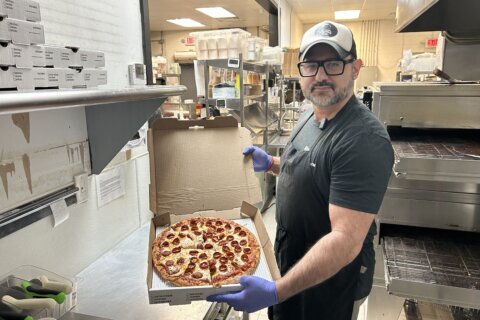This article was republished with permission from WTOP’s news partner InsideNoVa.com. Sign up for InsideNoVa.com’s free email subscription today.
This article was written by WTOP’s news partner InsideNoVa.com and republished with permission. Sign up for InsideNoVa.com’s free email subscription today.
Vienna Town Council members still are grappling with how to proceed with a shared-mobility program that would allow residents and visitors to zip around the town on electric bicycles and scooters.
Town officials have been examining programs implemented by Arlington County and the cities of Falls Church, Fairfax and Alexandria.
Building upon nearby jurisdictions’ shared-mobility programs will allow the town to take advantage of accumulated data, said Council member Steve Potter.
“We don’t need to reinvent the wheel, but we do need to make sure the wheel has some good traction in it,” he said.
Whether the Council decides to proceed with a pilot program to evaluate the use of shared-mobility devices in the town or passes an ordinance governing those operations, members must take some form of action before the state’s deadline of Jan. 1, 2020.
“If you don’t do anything, a company could just come in and start setting up,” Town Attorney Steven Briglia cautioned the Council. An absolute ban on such devices likely would be challenged in court, he added.
Council members disagreed over the length of a potential pilot program. Some favored a year-long one that would collect data over the full spectrum of months, while others, such as Council member Pasha Majdi, advocating for a shorter program of more limited scope.
Key factors still to be negotiated include whether helmet use should be required and whether to permit electric bicycles or scooters to be operated on sidewalks. Current town code requires young children to wear helmets when operating bicycles and allows them to ride on sidewalks. Briglia said he was unsure if helmet requirements could be imposed on adults, but added cyclists of all ages may ride on sidewalks if doing so on the adjacent roadway (such as busy Maple Avenue or Nutley Street) would prove hazardous.
The Council also will consider how to ensure the scooters are collected efficiently and not left in inconvenient places by riders. The town also many mandate “micro-mobility parking boxes,” from which users could pick up there mobility devices.
Some electric scooters can reach speeds of 20 mph and Council members expressed a desire for a lower speed limit.
Council member Douglas Noble, who is a transportation-operations engineer, said a shared-mobility program in Austin, Texas, uses electronic controls to limit scooters’ speeds to 8 mph in pedestrian areas.
Perennially hip Austin’s program has proved wildly successful, Noble said.
“Their scooter [riding] population went from like nothing to 10,000 within three months,” he said. “The companies just showed up.”







